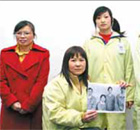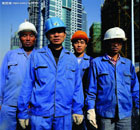People
A tale of Macao: past and present
By Joy Lu (chinadaily.com.cn)
Updated: 2009-12-19 20:31
 |
Large Medium Small |
MACAO: Mainland immigrant Sammie Yau says her feelings of desperation were overwhelming when she first arrived in Macao 10 years ago.
However, she now is a successful travel manager in this city of 5.5 million people.
A Guangzhou native, Yau met her Macao husband through a mutual friend and obtained her permit to settle in Macao in 1999, months before the city's December return to the motherland.
But the joy of reuniting with her husband, after years of separation, was short-lived. Unable to find a job and having to share a cramped apartment with her in-laws, Yau conceded she's had enough of the harshness of immigrant life in a city plagued by a long spell of economic recession and riddled with crime.
So I chose to stay close to the downtown area. I spent so much time window shopping there that nearly all the shop assistants got to know me," she said.
Things started to change noticeably for the better after the handover. The first signs of change Yau saw were improved law and order. To ensure a smooth handover, the government revamped its law enforcement forces and unleashed a crackdown on organized crimes in concerted efforts with Guangdong police authorities across the border.
In 2000, the numbers of homicides and arsons were down by 72 percent and 40 percent respectively over a year before. "People are no longer afraid of walking the street at night," Yau said of today's Macao which is considered one of the safest cities in the world 10 years after the handover.
On the heels of improved law and order came investors and tourists, breathing new life into Macao's tourism-dependent economy. Yau landed a job as a tour guide, a trade she described as challenging and rewarding.
Her seemingly prosperous career was thrown into turmoil in 2003 when the SARS (Severe Acute Respiratory Syndrome) epidemic struck Asia. Tourist arrivals nosedived. "Business had declined to the point that many of my colleagues thought about quitting the trade.
The pressure was tremendous but I hate being jobless," Yau said. The tourism sector would have remained sluggish for a much longer time, had the Individual Visit Scheme (IVS) not been launched, she said, referring to a policy change Beijing initiated to help Hong Kong and Macao offset the impact of SARS by allowing mainlanders to visit the two special administrative regions on an individual basis.
Before that, mainlanders had to travel in tour groups or on business permits. Relaxed travel restrictions opened the floodgates to the gigantic reservoir of mainland tourists.
Mainland-visitor numbers surpassed 3 million for the first time in 2004 and rose to 23 million last year. The tourism boom, fuelled largely by mainlanders, not only gave the local economy a new impetus but also allowed Yau to advance a couple of rungs up the career ladder thanks to her mainland background.
With her career taking off, Yau started to look at the city in a more positive light. Macao has morphed from a sleepy economy into a land of opportunities today, she said. "With its cultural ambience and unique history, Macao can carve a new niche in the conference and exhibition sector, in addition to the gaming industry," she said, exuding a level of confidence she could hardly imagine 10 years back.
Jeffery Wong, a business student at the University of Macao, echoed Yau's optimism. "I think there's a lot Macao can achieve, with the support of the mainland," he said. "The neighboring city of Zhuhai is trying to develop into an education and training hub in southern China. Macao is well-positioned to take advantage of this opportunity."
Macao has been given the green light to relocate the University of Macao to the Hengqin Island of Zhuhai, as part of an ambitious plan to make the 5-square-kilometer island an extension of Macao.
The constraint of land resources has been a bottleneck for the economic development of Macao, which totals 30 square kilometer in land area.
Fung Ngar-mui, in her 70s, is no longer in the work force but shared the younger people's buoyancy about Macao's future.
"Macao has come a long way in the last decade," she said. Increasing wealth has improved the city's welfare system by leaps and bounds. Since 2007, Macao children have been entitled to 15 years of free education from kindergarten to senior high school.
The government has also maintained a "wealth share" program in the past two years, giving each resident a slice of the budget surplus. Like all senior citizens, Fung has opened her individual retirement account, a new pension plan for all Macao residents when they reach the age of 65.
"I've got 10,000 patacas in my account," she announced proudly.












